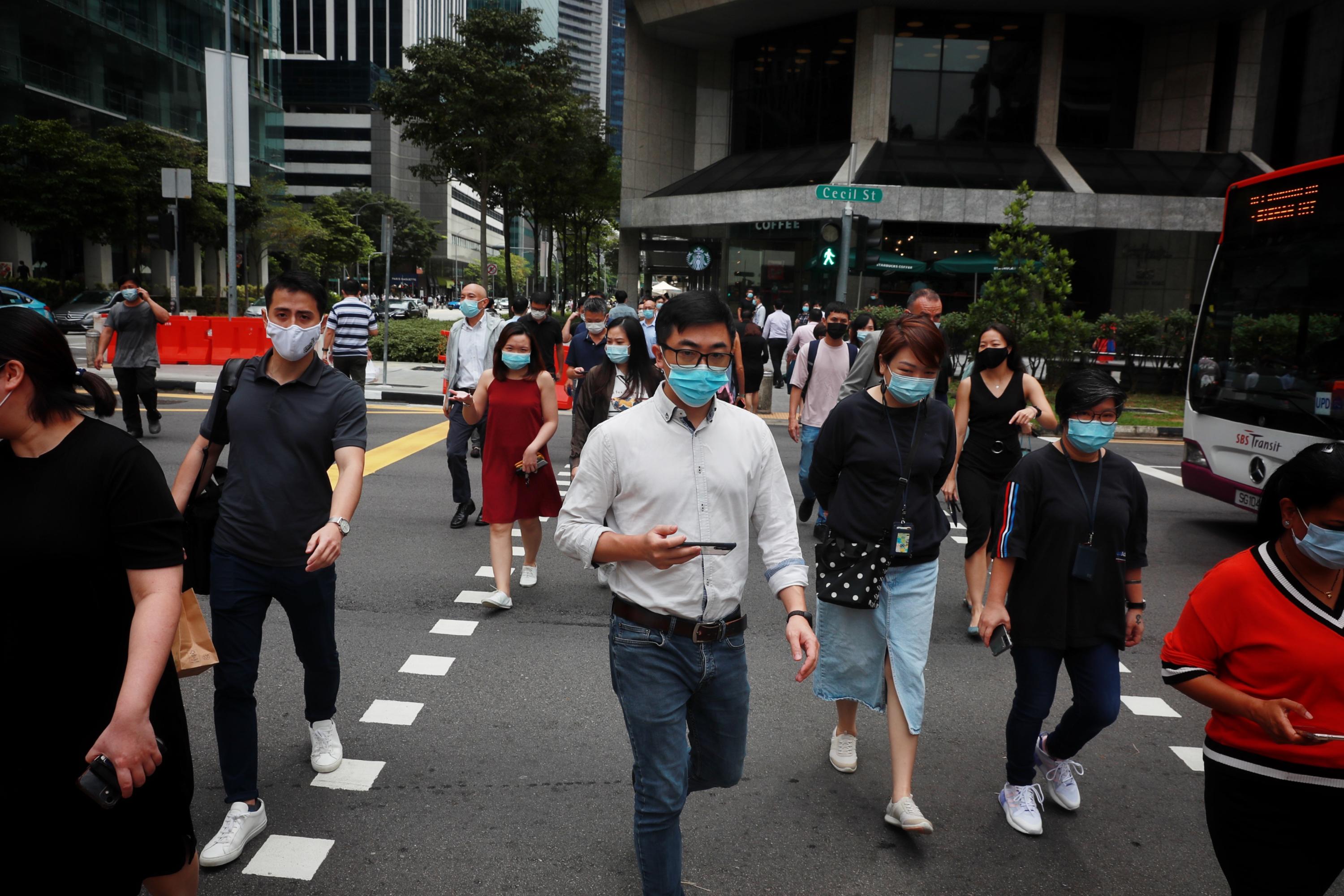S'pore firms confident despite Omicron wave, plan to make hybrid work permanent
Sign up now: Get ST's newsletters delivered to your inbox

Despite having more of their staff return to the office, some businesses have not found their workforce to be significantly affected by the virus.
PHOTO: ST FILE
SINGAPORE - Companies here are taking the surge in Covid-19 cases fuelled by the Omicron variant in their stride as they remain confident of their ability to stay flexible and responsive to the fluid pandemic situation.
This is backed by the hybrid working practices that most workplaces have put in place since the start of the pandemic and which they have continually refined over the past two years, according to industry players and experts interviewed by The Straits Times.
As at Jan 1, half of the workforce who can work from home may return to the workplace, subject to safe distancing measures.
Despite having more of their corporate and administrative staff return to the office, some businesses have not found their workforce to be significantly affected by the virus.
Dr Prem Kumar Nair, the chief executive of IHH Healthcare Singapore, said: "We have not seen a significant increase in the number of staff affected by the recent spike in Omicron cases, compared to our previous experience with the Delta variant."
He attributed this to factors such as strictly adhering to safe distancing measures and rostered routine testing, even as 50 per cent of his company's back-end workforce continues to return to the office.
Business continuity measures such as having split teams and tailoring hybrid work arrangements to suit business needs have generally helped companies keep going despite the potential road bumps posed by the virus.
Madam Low Peck Kem, president of the Singapore Human Resources Institute (SHRI), noted that many companies have adopted various hybrid work arrangements that best meet their business needs and which are still in compliance with Singapore's current set of safe management measures and legislative requirements.
She cited having split teams as an example, where different teams work in different locations to ensure they do not cross-contaminate in the event of an infection.
Companies also invested in remote working infrastructure during the pandemic and are promoting employee mental wellness to ensure productivity levels remain high even when working from home.
Ms Linda Teo, country manager of Manpower Group, said: "Companies have upgraded their digital infrastructure to ensure they have the technology required to support their business functions.
"Many companies have also implemented new policies to address their employees' well-being, one of them being a 'right to disconnect' policy."
This can take the form of encouraging staff not to respond to work-related messages after working hours.
Ms Jaya Dass, managing director for Singapore and Malaysia at recruitment agency Randstad, said: "We have communicated to our staff that they should not be responding to non-urgent e-mails and text messages after working hours as they will result in unnecessary overtime and stress."
With firms making such changes amid the pandemic, four out of five employers told ST they intended to prioritise making flexible working arrangements permanent.
This comes as firms observe comparable or improved staff productivity as a result of hybrid working arrangements.
DBS Bank, for instance, has given all employees the flexibility to work remotely up to 40 per cent of the time since February last year.
Ms Lee Yan Hong, the bank's head of group human resources, said: "Our research found that over four in five employees were able to work seamlessly remotely. Employees also shared that they preferred hybrid work arrangements over a pure ‘remote work’ or ‘work in office’ approach."
This study was done by the bank's Future of Work Taskforce on its global, over 30,000-strong workforce.
Another firm that has adopted a permanent hybrid arrangement for better work-life balance is Changi Airport Group (CAG), which created a category of annual leave that enables employees to travel overseas more conveniently during the pandemic.
This leave arrangement allows its 1,800 employees to work for up to 10 working days while serving quarantine or isolation overseas or in Singapore, should they travel to countries not on the vaccinated travel lanes list.
Ms Lynnette Lee, a manager from CAG who utilised this leave type for a holiday in Croatia in October last year, said: "I'm glad to have had the opportunity to refresh and recharge, and it was a bonus to be able to use this leave while serving my quarantine upon my return to Singapore."
Despite this, not all firms have been able to adapt as easily amid Covid-19.
Industry bodies have observed that small and medium-sized enterprises (SMEs), in particular, may not always have it easy when adopting hybrid working arrangements.
Mr Ang Yuit, vice-president of the Association of Small and Medium Enterprises (ASME), said: "While some individual employees may have reported improved productivity from the reduced commute time, many employees have reflected from the ground that a lack of teamwork from fewer face-to-face meetings have harmed company-wide alignment."
Some companies, such as contracting company Fabristeel, have also had to factor in additional costs to projects as part and parcel of living with the virus.
The firm, which installs kitchen equipment, had to shoulder the cost of more expensive on-demand labour to make up for manpower shortages whenever its workers fell ill while meeting deadlines for projects.
Despite this, the firm has said that disruption has been minimal to its workforce of 90 due to adequate health safety measures.
A firm spokesman said: "With the various sites we have active, we are just thankful that we have emerged relatively unscathed so far due to the safety measures recommended by the Ministry of Health."


